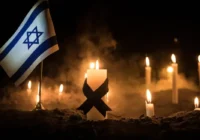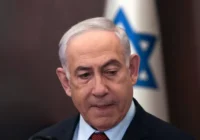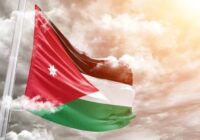Jordan’s King Abdullah II is caught between a rock and a hard place. Hamas and its regional supporters, as well as Israeli politicians and vigilantes, are pressuring the king from both ends of the political spectrum. Iranian-backed Syrian and Iraqi militants seek to draw the kingdom into the Gaza war, as Palestinians account for at least 50% of Jordan’s population.
Hamas, the Muslim Brotherhood and Iran want to turn Jordan into a regional flashpoint and funnel for weapons to Palestinian militants in the West Bank.
“The Iranians have instructions to recruit Jordanians and penetrate the Jordan arena through agents. Their recruitment efforts span all segments of society,” said Saud Al Sharafat, a former senior Jordanian intelligence official.
In January 2024, Iranian-backed Iraqi groups supported Hamas by attacking a United States military base. The assault killed three US soldiers and wounded at least 34 others. The US retaliated with a series of airstrikes, so Iran quickly reined in the militias.
At the other end of the political spectrum, vigilante Israeli settlers attacked Jordanian humanitarian truck convoys as they drove across the West Bank en route to Gaza. Israeli politicians led by far-right National Security Minister Itamar Ben Gvir complicated King Abdullah’s life. On May 22, they made a provocative visit to the Temple Mount. Better known as Haram ash-Sharif, this Jordanian-administered place is Islam’s third holiest site.
King Abdullah’s contentious drone response
Several of King Abdullah’s choices have put him in the firing line. On April 19, he intercepted Iranian drones traveling through Jordanian airspace during the Islamic Republic’s massive offensive on Israel. Further, in March and April, he cracked down on pro-Palestinian demonstrations.
King Abdullah defended the downing of Iranian drones violating Jordanian airspace as an act of self-defense, insisting that “Jordan will not be a battlefield for any party.” Even so, King Abdullah may not have had a choice but to take down the drones. After all, he has long been a US ally and remains dependent on its military and economic support.
The king’s critics were quick to post disparaging, edited images on social media. These depict him wrapped in an Israeli flag or donning an Israeli military uniform, accompanied by negative comments such as “traitor” and “Western puppet.” Engineer Hamid Jahanian sarcastically congratulated King Abdullah, saying that he “not only failed to support the fellow Arab Palestinians but also took the extra mile to support their genocidal murderer.”
The crackdown and assistance in Israel’s defense have drowned out an important fact: Jordan is the only Arab country to withdraw its ambassador to Israel and consistently send aid to Gaza. Jordan is one of five Arab countries that maintain diplomatic relations with Israel.
Meanwhile, Jordanian sources assert that the Muslim Brotherhood organized the protests. Jordan’s unemployment rate is approximately 22%. Nearly half of young people are unable to find a job. With these in mind, officials feared that the pro-Palestinian demonstrations could morph into social and economic protests.
King Abdullah and Israel face mounting tensions
King Abdullah faces a predicament that highlights the Gaza war’s potential to further destabilize the Middle East. Jordan’s geography does not help it; the West Bank is on its western border, Syria is to its north and Iraq is to its east. Politics could spark paradigm shifts in several key Middle Eastern states, including Israel and Iraq.
King Abdullah likely sees that Benjamin Netanyahu’s space comes with rapidly shrinking benefits. There is mounting public demand for Israel to end the Gaza war in order to prompt Hamas to release its hostages. International courts aim to force Israel to halt its Gaza offensive. They want to hold the prime minister and Defence Minister Yoav Gallant accountable for the country’s war conduct. Hamas’s recent rocket attack on Tel Aviv will probably offer Netanyahu only brief relief, if any.
King Abdullah may also see mileage in popular Iraqi Shia cleric Moqtada Al Sadr’s decision to reenter politics and run in next year’s elections. This would challenge the pro-Iranian Coordination Framework, which is the backbone of Prime Minister Mohammed Shia al-Sudani’s government.
For now, King Abdullah’s crackdown on mass pro-Palestinian protests has reduced domestic pressures, even if widespread anger continues to bubble at the surface.
Foiled plots in Jordan bode ill for Israel
In May, Jordanian sources said that security services had foiled a suspected Iranian-led plot to smuggle weapons into the kingdom. These would help King Abdullah’s opponents carry out acts of sabotage. According to the sources, an Iranian-backed Syrian militia had sent the weapons to Jordanian Palestinian members of the Muslim Brotherhood. These members had links to Hamas, which is a Brotherhood affiliate.
In March, Israel’s Shin Bet domestic security agency said it had stopped Iranian attempts to smuggle large quantities of advanced weapons into the West Bank. Allegedly, this was organized by two parties: Unit 4000, the intelligence unit of the Special Operations Division of the Islamic Revolutionary Guards Corps, and the Special Operations Unit 18840 of the Guards’ Quds Force in Syria.
According to Shin Bet, Munir Makdah, a senior Lebanon-based official of Palestinian President Mahmoud Abbas’ Al Fatah movement, was involved in the smuggling attempt. The agency said the weapons cachet included fragmentation bombs, anti-tank landmines with fuses, grenade launchers, shoulder-launched anti-tank missiles, RPG launchers and rockets, C4 and Semtex explosives.
In response to the most recent plot, Hamas insisted it had “no ties to any acts targeting Jordan.” A Jordanian Muslim Brotherhood official said its arrested members had acted independently.
Even so, Hamas leaders have repeatedly insisted Jordanians answer the call of duty since the Gaza war erupted in October 2023. “We call on our brothers in Jordan, in particular, to escalate all forms of popular, mass, and resistance action. You, our people in Jordan, are the nightmare of the occupation that fears your movement and strives tirelessly to neutralize and isolate you from your cause,” said Hamas military spokesman Abu Obeida.
Senior Doha-based Hamas official Khaled Mishaal, who survived an Israeli assassination attempt in 1997, held a video address. In it, he told a women’s gathering that “Jordan is a beloved country, and it is the closest to Palestine, so its men and women are expected to take more supportive roles than any other people towards the land of resistance and resilience.”
In April, Iranian-backed Iraqi militants asserted that they stood ready to arm 12,000 fighters of the Islamic Resistance in Jordan. According to these militants, the fighters would open a new front against Israel. Abu Ali al-Askari, a Kataib Hezbollah security official, suggested that this offer may have been made to test Hamas and Palestinian Islamic Jihad’s assessment: If Jordanian militants gained access to weapons, they would immediately battle Israel.
Despite mounting public anger; a handful of border incidents; and the efforts by Hamas, the Muslim Brotherhood and Iranian-backed groups, there is no evidence of an Islamic fighting force in tightly-controlled Jordan. The threat of renewed protest and increasing militancy may be more bluster than reality.
Scholar and journalist Rami Khouri suggested Jordan was managing a delicate balance. But in his words, “It’s always been there. The Jordanians have always figured it out… The situation is not going to threaten the stability of the country as long as you still have the large-scale American military [and] financial support for Jordan.”
[The Turbulent World first published this piece.]
[Lee Thompson-Kolar edited this piece.]
The views expressed in this article are the author’s own and do not necessarily reflect Fair Observer’s editorial policy.
Support Fair Observer
We rely on your support for our independence, diversity and quality.
For more than 10 years, Fair Observer has been free, fair and independent. No billionaire owns us, no advertisers control us. We are a reader-supported nonprofit. Unlike many other publications, we keep our content free for readers regardless of where they live or whether they can afford to pay. We have no paywalls and no ads.
In the post-truth era of fake news, echo chambers and filter bubbles, we publish a plurality of perspectives from around the world. Anyone can publish with us, but everyone goes through a rigorous editorial process. So, you get fact-checked, well-reasoned content instead of noise.
We publish 2,500+ voices from 90+ countries. We also conduct education and training programs
on subjects ranging from digital media and journalism to writing and critical thinking. This
doesn’t come cheap. Servers, editors, trainers and web developers cost
money.
Please consider supporting us on a regular basis as a recurring donor or a
sustaining member.
Will you support FO’s journalism?
We rely on your support for our independence, diversity and quality.










Comment